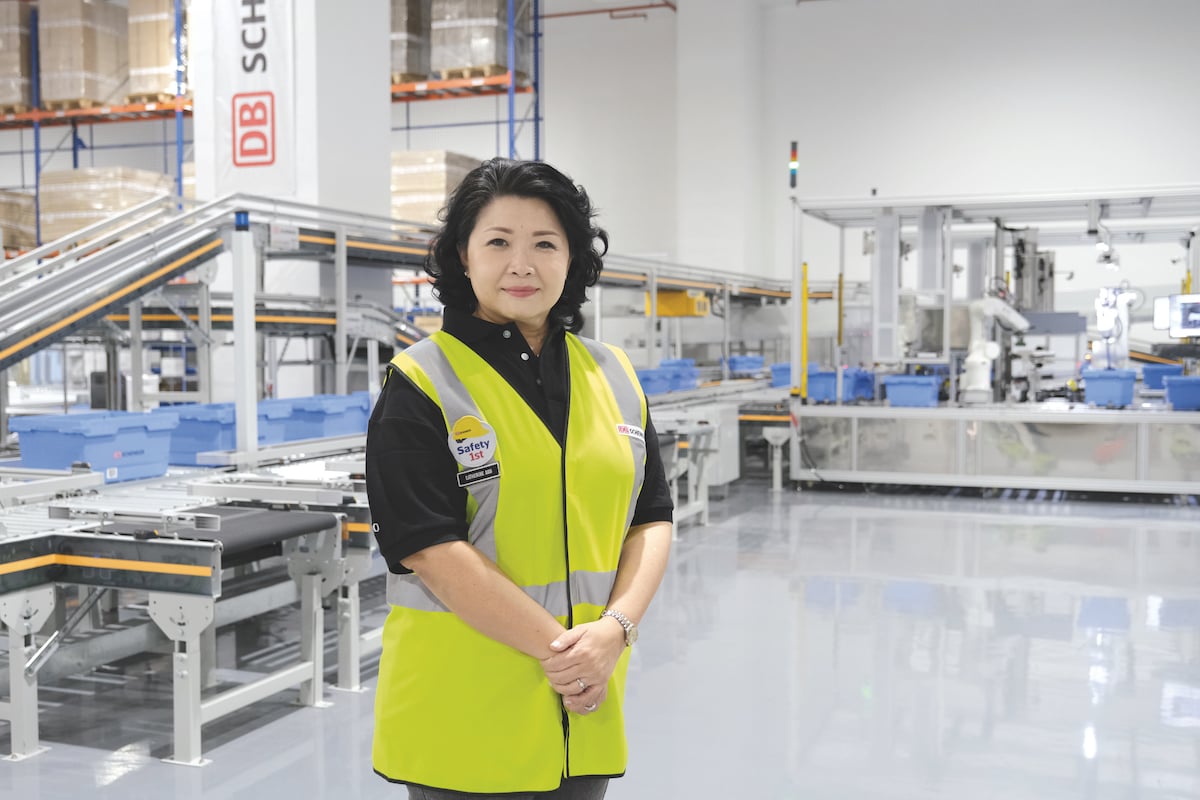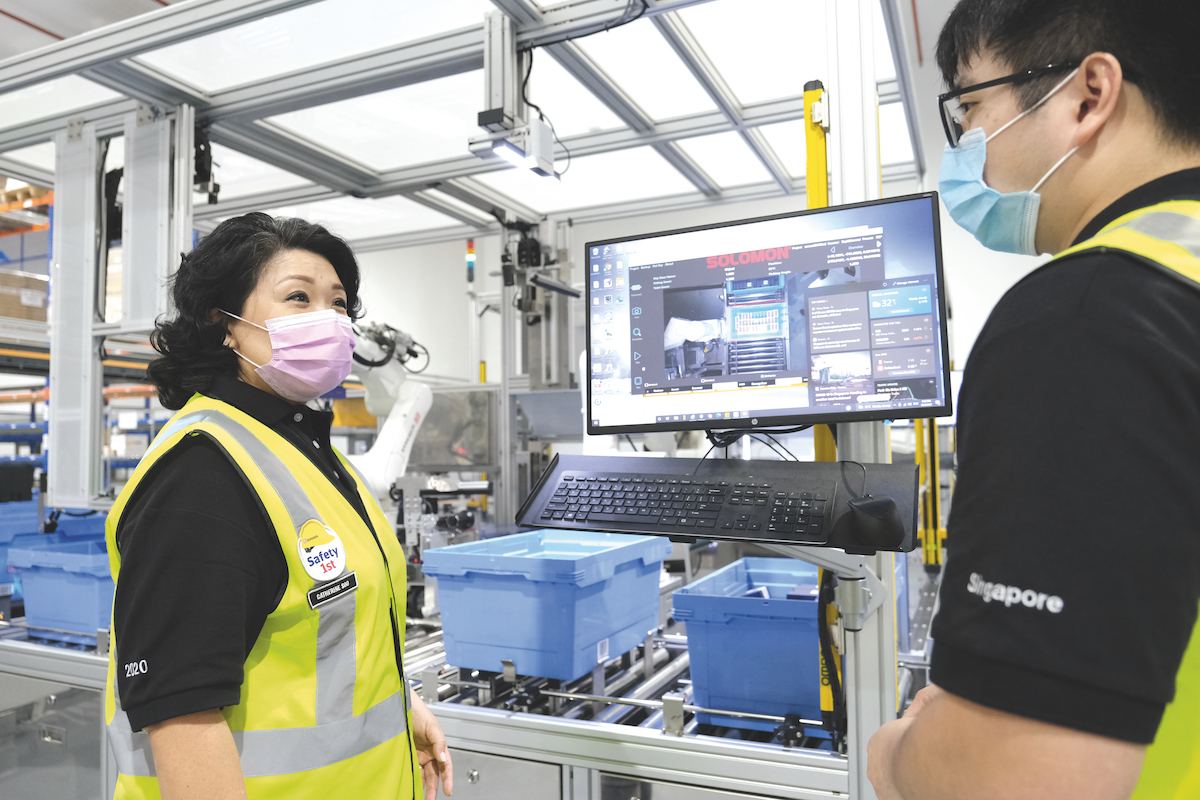The Shipping News: Catherine Soo
With the goal of leading the nation in supply chain efficiencies, DB Schenker has made substantial investments in Singapore to establish integrated logistics facilities, says Vice President Contract Logistics for Singapore Catherine Soo.
For a small island nation, Singapore has built a formidable reputation as one of the major commerce hubs of Asia. DB Schenker, a company with a 149-year history acquired by the German Railways in 1931, recognised Singapore’s strategic and commercial importance when it established a subsidiary there in 1970.

DB Schenker Singapore has grown since then to cover a full suite of logistics and supply chain management services. The inauguration of its Singapore logistics centre in 1996 paved the way for a number of Schenker distribution centres there. In 2007 the company acquired BAX Global to consolidate and expand into cross-border services to provide multi-model product offerings to its customers.
Catherine Soo joined DB Schenker Singapore in 2016 as Vice President Contract Logistics after a successful career at Volkswagen that took her around the world. During that time, she handled purchasing, sales, marketing and supply chain duties, but her special talents in logistics brought her to the attention of DB Schenker, which invited her to take on her current role.
"Having worked in Germany, China and the UK, I have a good network, knowledge and perspective of different cultures. From sourcing strategies through to fulfilment of raw materials and finally placing the goods into customers’ hands in a timely fashion, I can see the supply chain plays a critical role," she explains.

Catherine’s role at Schenker neatly complements her shipper’s experience, which focused on customer priorities and seamless execution. "I have 1,300 staff operating the biggest contract logistics footprint in Singapore; we’re an industry leader. It’s a huge responsibility to carry, and I’m very proud to be supported by such a great team," she says.
"While I’ve gained tremendous experiences from my past international roles, nothing beats the satisfaction of assuming direct responsibility in a country role, where the impact of my decisions can be instantly felt and measured."
In 2020, DB Schenker opened its flagship logistics facility, Red Lion, in the free trade zone of the Airport Logistics Park Singapore. Costing €101 million (US$119 million), it was the company’s largest ever investment globally, bringing state-ofthe- art automation, robots and autonomous vehicles into the 50,000-square-metre, seven-storey complex.
Integrated with contract logistics, its onsite air freight operations provide reduced lead times and more efficient logistics processes to customers from its strategic location – a mere two minutes from the airport terminal.
"Upskilling is very important. It keeps us agile and relevant."
The goal of Red Lion, which was built on the last piece of available land in the free trade zone, is to maximise efficiency through the integration of freight and contract logistics services to Schenker customers. This integration delivers significant time savings and scalability, and infuses its supply chain with extra resilience.
"Red Lion has a lot of automation to improve the productivity and stability of the business," Catherine shares. "We incorporate eight different types of automation with our in-house IT systems to synchronise various work streams. This requires complex development, interfaces and extensive testing to ensure a seamless integration between various operating systems."
Red Lion went live in May last year, just as the COVID-19 pandemic struck, but DB Schenker went ahead as planned. Catherine admits it was extremely challenging, especially with a reduced workforce. "We’re glad the launch was a success nonetheless," she says. "We decided to soldier on and refused to back down from our committed launch date, which involved extensive planning and stakeholders across 15 countries. Our vendors, who worked with us on automation go-live, were under government movement control orders, social-distancing controls, and so on. But I’m glad that not only did the Red Lion go live, we managed 100 per cent uptime. I’m proud of the achievement and the team’s tenacity despite the unforeseen challenges."
Future Supply
The pandemic has placed added pressure on DB Schenker’s business in Singapore, but Catherine considers that change was coming to the logistics industry anyway; the pandemic simply shone a light on where it could and should adapt.
"Our business requirements will definitely change, and COVID-19 accelerated this change. Shorter lead times and being closer to the market become more and more important," she points out. "Some countries and some brands have suffered because they focused heavily on a centralised supply chain, and I envisage more regional or country hubs will be established to be closer to the market, and more diversification of the supply chain to minimise transport and supply disruption. Manufacturing will move some tasks to service providers like us, and the ability to handle light manufacturing will bring change to conventional value-added services."
Logistics is a male-dominated industry, which has never fazed Catherine, but increased female participation in the industry is now evident, and is paying dividends through greater openness and respect in interaction between staff and with customers. She has also noticed change in DB Schenker’s ranks, and welcomes it.
"I think gender diversity is very important," she asserts. "It shows that the organisation is open to different opinions and viewpoints. Women look at things differently compared to men, and I think it shows that the organisation is prepared to accept differences. I never feel intimidated in the male world. I think respect is gained when you achieve the result, irrespective of your gender."
Leading large teams of mostly men has taught Catherine that achieving results comes down to planning, giving clear instructions and walking the talk. Decisions must be based on the available information and require full commitment from the whole team once made.
Global vision
DB Schenker is active in 2,100 locations around the world, and employs more than 74,000 people in its operations.
"You will never know 100 per cent; nothing is for certain. As a leader, you need to evaluate the situation logically, seek inputs and validate with data even though you may have the answer in mind. You will need to evaluate the kinds of risk there would be, so with a lot of logical thinking and your experience, you can make the best decision.
"Being frank and being factual is important. I value open feedback, and I’m not concerned too much about hierarchy. I value honest and constructive conversations with colleagues across different rank and file, particularly with frontline staff engaged in the day-to-day execution. I may not know everything, and a strong team with diverse ideas and knowledge will guide me in the right direction."
Employee input also creates an environment for entrepreneurship to flourish, providing opportunities for employees to ‘own’ successful outcomes and generate an impetus to contribute new ideas gained from their own experience. "I like to create entrepreneurship in the organisation," Catherine confirms.
"I encourage staff to constantly upgrade their skill sets, not only for their roles today. Continuous learning is very important for everybody, because the landscape we live in is evolving and ever-changing. I always encourage staff to selfimprove, retrain and gain knowledge. I request that they attend external conferences, seminars and coffee corners to expand the network beyond Schenker, especially for long-serving staff."
That longevity brings with it a sense of ownership and teamwork that is invaluable in a shifting business environment. But Catherine is keen to push people outside their comfort zones.
"Longevity is one thing that our staff are very comfortable with because we are like a family," she says. "But sometimes I want them to open their eyes to build a bigger network so they can meet people with different opinions, and also learn from others’ mistakes and success. So upskilling is very important. It keeps us agile and relevant."
Proudly supported by: